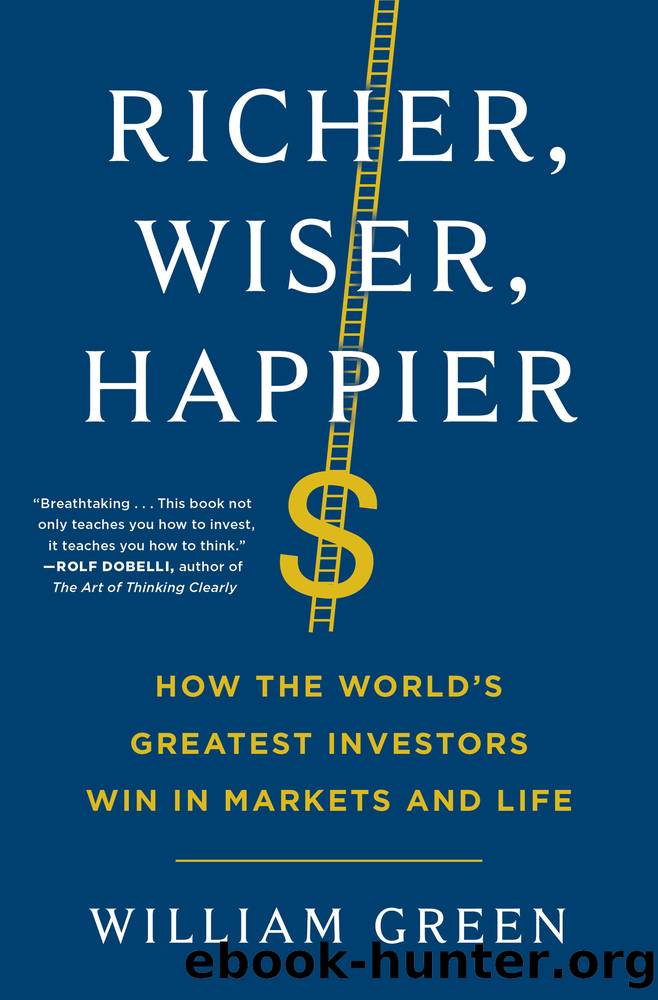Richer, Wiser, Happier by William Green

Author:William Green
Language: eng
Format: epub
Publisher: Scribner
Published: 2021-04-20T00:00:00+00:00
A House Built on Rock
Sleep and Zakaria named their fund Nomad because they were willing to roam anywhere in search of value. They were not trying to replicate a particular index or perform well on a relative basis. They were gunning for outstanding absolute returns, unconstrained by reference to what anyone else was doing. Their quest took them to some of the least popular corners of the globe.
The fund began trading on September 10, 2001âone day before the attack on the Twin Towers. Markets cratered as investors confronted unfathomable threats of terrorism, war, and economic disruption. Adding to the gloom, many investors were still in shock from the bursting of the tech bubble. Sleep and Zakaria invested boldly amid the turmoil, targeting temporarily depressed businesses that others were too scared to own, since the future seemed so precarious.
In the Philippines, they invested in Union Cement, the nationâs largest cement producer, after its stock had plunged from thirty cents to less than two cents. Pessimism was so pervasive that the market valued the business at one-quarter of the replacement cost of its assets. In Thailand, they invested in Matichon, a newspaper publisher whose stock had crashed from $12 to $1. It traded at 0.75 times revenues and was worth about three times what they paid for it. In the United States, they bought preferred shares of Lucent Technologies, a fallen telecom star that had lost 98 percent of its value. These were classic âcigar buttsâânot the best businesses, but fantastically cheap. By the end of 2003, Nomadâs net asset value had doubled as opportunistic bets like these paid off.
The supply of bargains dwindled as fears receded and markets revived. So Sleep and Zakaria ventured to one of the few remaining pockets of despair. In 2004, they crossed the border from South Africa into Zimbabwe. Under Robert Mugabeâs despotic rule, Zimbabweâs economy was paralyzed by corruption, a currency collapse, the nationalization of many privately owned farms, and mobs of looters. Undaunted, Sleep and Zakaria bought a basket of four Zimbabwean stocksâvirtual monopolies that traded as if they were almost worthless. Zimcem, a cement producer, sold on the stock exchange in Harare for one-seventieth of the replacement cost of its assets.
Writing to Nomadâs investors about the perverse appeal of this detested market, Sleep remarked, âThe clients will hate it. Compliance will hate it. The consultants will hate it. Marketing will hate it. The size of the investment opportunity is tiny. It is not part of the benchmark.⦠Itâs perfect.â
For a while, Nomad valued its basket of bargains at zero because trading on Zimbabweâs stock exchange ceased entirely. The economy remained a catastrophe. Still, by the time Nomad sold the last of its Zimbabwean stocks in 2013, theyâd risen between threefold and eightfold. As a souvenir, Sleep and Zakaria gave each Nomad shareholder a worthless banknote for 100 trillion Zimbabwean dollars, which the government had issued at the height of hyperinflation.
Nomadâs appetite for reasonable businesses selling at unreasonably low prices made sense, given the opportunities available at the time.
Download
This site does not store any files on its server. We only index and link to content provided by other sites. Please contact the content providers to delete copyright contents if any and email us, we'll remove relevant links or contents immediately.
Rich Dad Poor Dad by Robert T. Kiyosaki(6633)
Pioneering Portfolio Management by David F. Swensen(6301)
How To Win Friends and Influence People by Dale Carnegie(4513)
The Money Culture by Michael Lewis(4207)
The Dhandho Investor by Mohnish Pabrai(3765)
The Wisdom of Finance by Mihir Desai(3747)
Liar's Poker by Michael Lewis(3449)
Fooled by Randomness: The Hidden Role of Chance in Life and in the Markets by Nassim Nicholas Taleb(3124)
The ONE Thing by Gary Keller(3071)
Mastering Bitcoin: Programming the Open Blockchain by Andreas M. Antonopoulos(3045)
The Intelligent Investor by Benjamin Graham Jason Zweig(3041)
The Psychology of Money by Morgan Housel(3036)
Rich Dad Poor Dad: What The Rich Teach Their Kids About Money - That The Poor And Middle Class Do Not! by Robert T. Kiyosaki(2958)
Investing For Dummies by Eric Tyson(2954)
How to Day Trade for a Living: Tools, Tactics, Money Management, Discipline and Trading Psychology by Andrew Aziz(2949)
How to Win Friends and Influence People by Dale Carnegie(2915)
Market Wizards by Jack D. Schwager(2701)
How to Pay Zero Taxes, 2018 by Jeff A. Schnepper(2655)
Zero Hour by Harry S. Dent Jr. & Andrew Pancholi(2647)
